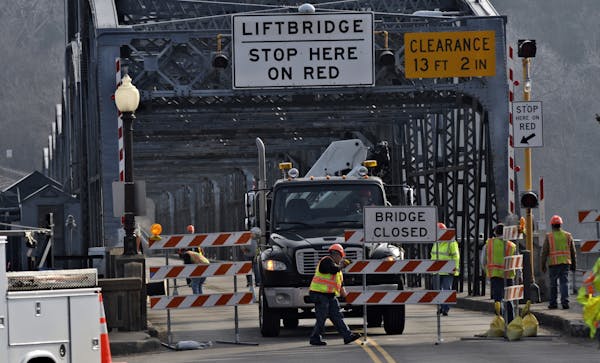U.S. Sen. Amy Klobuchar's decision to serve as chief sponsor of the infrastructure-laden Rebuild America Jobs Act has been described as a brassy partisan move, not in keeping with the Democratic senator's usual bipartisan proclivities.
That analysis says more about the current lawmaking climate in Washington than it does about Minnesota's senior senator. Infrastructure -- roads, bridges, sewers, transit, rail, airports -- is well within government's traditional sphere of responsibility.
Both political parties used to hold that safe, adequate public infrastructure is key to creating an environment in which commerce can flourish.
It shouldn't seem unusual or partisan for a senator from the state that experienced a freeway bridge collapse four years ago to seek to prevent future breakdowns.
"This is about making sure we have the kind of roads and bridges and water treatment plants that work in Minnesota," Klobuchar said Tuesday. "No one knows better than our state does how important that is."
Repairing roads, bridges, runways and transit lines is at the heart of the bill Klobuchar introduced on Monday.
The Rebuild America Jobs Act would provide $50 billion for improvements, with more than half going toward fixing roads and bridges.
It also would create a $10 billion infrastructure bank -- a public-private partnership fund that in the past enjoyed bipartisan sponsorship.
What gives this bill a partisan stamp is the way those investments would be funded. It imposes a 0.7 percent surtax beginning in 2013 on adjusted gross incomes in excess of $1 million.
That's in keeping with President Obama's renewed call in recent weeks for higher taxes on Americans best able to afford them.
The Republicans who control the House oppose any tax increase, but have been particularly hostile to tax-the-rich schemes.
If Congress were a functional lawmaking body, that taxsource. Both parties would be working behind the scenes to agree on a substitute.
Both would be trying to respond to the nation's conspicuous need for infrastructure upgrades. Both would sense a duty to be good stewards of the nation's public assets and of the economy those assets support.
They might even both agree that while projects begun in the next year would generate good-paying private-sector jobs when the economy badly needs them, those jobs aren't the best reason to invest.
The improvements themselves, and the expansion of the nation's economic capacity that they bring, are the prize.
As Klobuchar said: "This is about building our economy for the next decade. A lot of our success will be based on getting exports out, with roads, bridges, barges and airways that work. Right now, we are falling behind."
Sensible bipartisan lawmaking of the sort we're describing is difficult to come by in today's Washington.
Our hope is that it is still possible in St. Paul. Minnesota has become a microcosm of the nation not only in the worsening condition of its infrastructure, but also the habit of dodging long-term problems.
State government took action on transportation deficiencies in 2008, but has avoided the topic since then.
Last week, the Minnesota Transportation Alliance released its analysis of the additional state spending it says is needed in the next 20 years to maintain the system at current levels and to make minimal transit improvements. The figure: $30 billion, or $1.5 billion per year.
Notably, the alliance chose not to call for a big and politically contentious tax increase to close that gap.
Instead, the group served up a laundry list of lesser revenue "enhancers," asked for more general obligation bonding, and suggested ways to make construction dollars stretch farther.
Among the ideas: close highways during construction, create more high-occupancy toll lanes, allow cities and counties to impose transportation-related fees and taxes.
It's a savvy list tailored for a politically divided time -- one that Klobuchar and her colleagues might do well to examine.
* * *
Readers, what do you think? To offer an opinion considered for publication as a letter to the editor, please fill out this form. Follow us on Twitter @StribOpinion and Facebook at facebook.com/StribOpinion.
Readers Write: Presidential immunity, Sen. Nicole Mitchell
![O'Shaughnessy Stadium was photographed at the University of St. Thomas' St. Paul campus on Friday, Nov. 6, 2020. ] AARON LAVINSKY • aaron.lavinsky@s](https://arc.stimg.co/startribunemedia/4T767TPWMLRIJRHF67U45OBYDM.jpg?h=91&w=145&fit=crop&bg=999&crop=faces)
Editorial counterpoint: St. Thomas does work with its neighbors
Troubling talk on campus protests

Counterpoint: Anoka-Hennepin's DEI policies actually do warrant a debate

